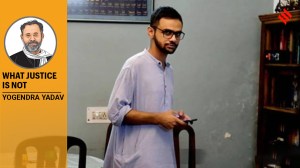IN STRONG remarks, the Supreme Court on Monday asked why the Tamil Nadu Governor had acted on some Bills sent for his assent only after the matter had reached the court. Saying that the Bills had been pending since January 2020, it asked: “What was the Governor doing for three years?”
The Bench, led by Chief Justice of India D Y Chandrachud, was hearing a petition filed by the Tamil Nadu Government accusing Governor R N Ravi of not acting on some Bills sent by the Legislature.

Last week, days after the Supreme Court expressed concern over Governors not acting on Bills, Ravi had withheld assent and returned 10 pending Bills to the state government. In a special sitting on Saturday, the Tamil Nadu Assembly re-adopted the Bills.
Story continues below this ad
“The Governor says he has disposed of these Bills on November 13. Our concern is that our order was passed on November 10. These Bills have been pending since January 2020. It means that the Governor took the decision after the court issued notice. What was the Governor doing for three years? Why should the Governor wait for the parties to approach the Supreme Court,” the CJI asked.
Attorney General R Venkataramani said that of the 181 Bills sent to the Governor since 2020, 152 Bills had been cleared. He said the dispute was only about Bills which sought to deprive the Governor of his power as Chancellor to appoint Vice-Chancellors of universities. Pointing out that the 10 Bills had been re-adopted by the TN Assembly and presented again to the Governor, he urged the court to await the outcome.
The Bench, also comprising Justices J B Pardiwala and Manoj Misra, agreed to the request and fixed the next hearing for December 1.
Senior Advocate A M Singhvi, appearing for the TN government, said Ravi had “violated every word of the provision” that defines what Governors have to do if a Bill is forwarded by the Legislature. “Does the Governor have a pocket veto,” he asked.
Story continues below this ad
“Suppose the state enacts an amendment to the Income Tax Act which is beyond the competence of the Legislature. What does the Governor do in such a case,” the CJI asked.
“That’s why he has been given a third option of sending it to the President,” Singhvi responded.
The CJI said the provision states that once the Legislature sends it back, the Governor shall not withhold assent. “So can he send it to the President once the Bill is resubmitted,” he asked.
Singhvi said the Governor cannot do so after sending it back to the House. “The object was never of the Governor sitting on the Bill and delaying,” he said.
Story continues below this ad
Explaining this, the CJI said: “I will give you the reason why. There may be a situation where the deficiency of the Bill can be cured by amendment to the Bill, in which case he can send it back to the House…There may be cases where the deficiency cannot be cured at all. For instance, where the Legislative Assembly lacks legislative competence. Then there is no question of sending it back…”
Interjecting, the AG said, “the Governor is not a mere technical supervisor”. He said that of the 181 Bills sent to the Governor between 2020 and 2023, assent was given to 152 Bills. Five Bills were withdrawn by the government, and nine Bills were reserved for the consideration of the President, he said.
“The only Bills over which there is some difference in the context of universities’ amendments, taking away the power of the government to appoint Vice-Chancellor and giving it to the executive,” he said.
Asked how long the matter should be adjourned for, the AG said: “These Bills require some element of consideration. For the petition to be moved in this manner, to get indirectly an assent of the court for the Bill, I think there are some questions to be addressed. Let it wait for some time”.
Story continues below this ad
The Bench agreed that it would wait for what the Governor had to say on the Bills. It made it clear that it was not entering into the merits of the Bills, but noted that some of the Bills were sent to the Governor in 2020 and some in 2022.
The AG said the current Governor had assumed office on November 18, 2021.
“We are not talking of one Governor… we are talking about the office of the Governor,” the CJI said.
“The issue is not whether any particular Governor had delayed in the discharge of the constitutional functions entrusted under Article 200, but whether, in general, there has been a delay in exercising the Constitutional function,” the court said in its order.
Story continues below this ad
On November 10, a Bench presided by the CJI had issued notice on a Tamil Nadu government plea accusing the Governor of withholding consent to Bills sent by the State Legislature.
The same day, the Bench, while taking exception to the Punjab Governor not clearing Bills on the ground that the Assembly session in which they were passed was not constitutionally valid, asked him to “proceed to take a decision on the Bills… on the basis that the sitting…was constitutionally valid”.









